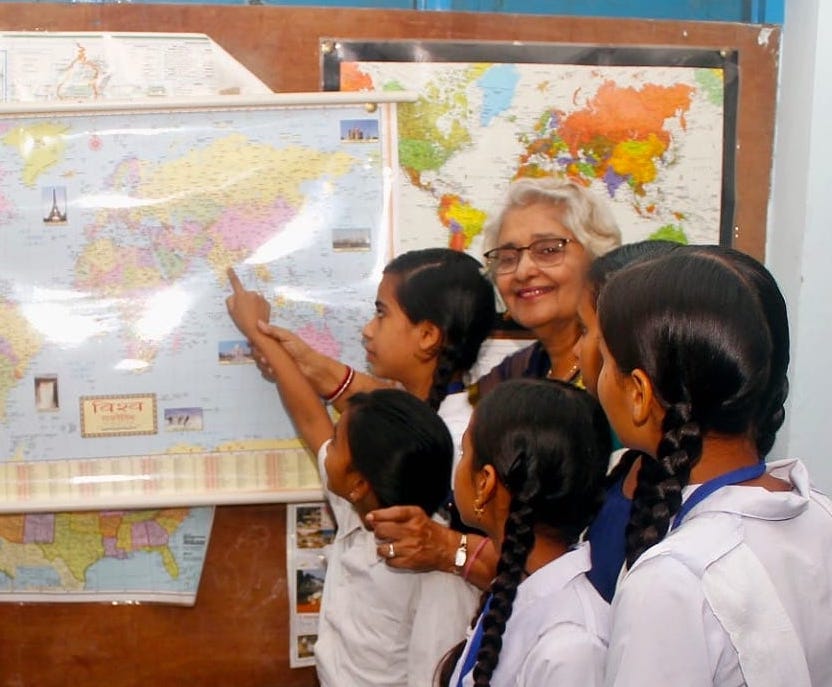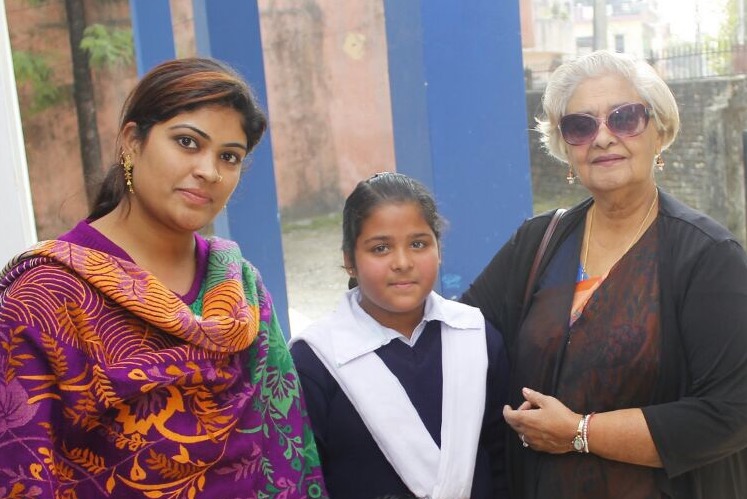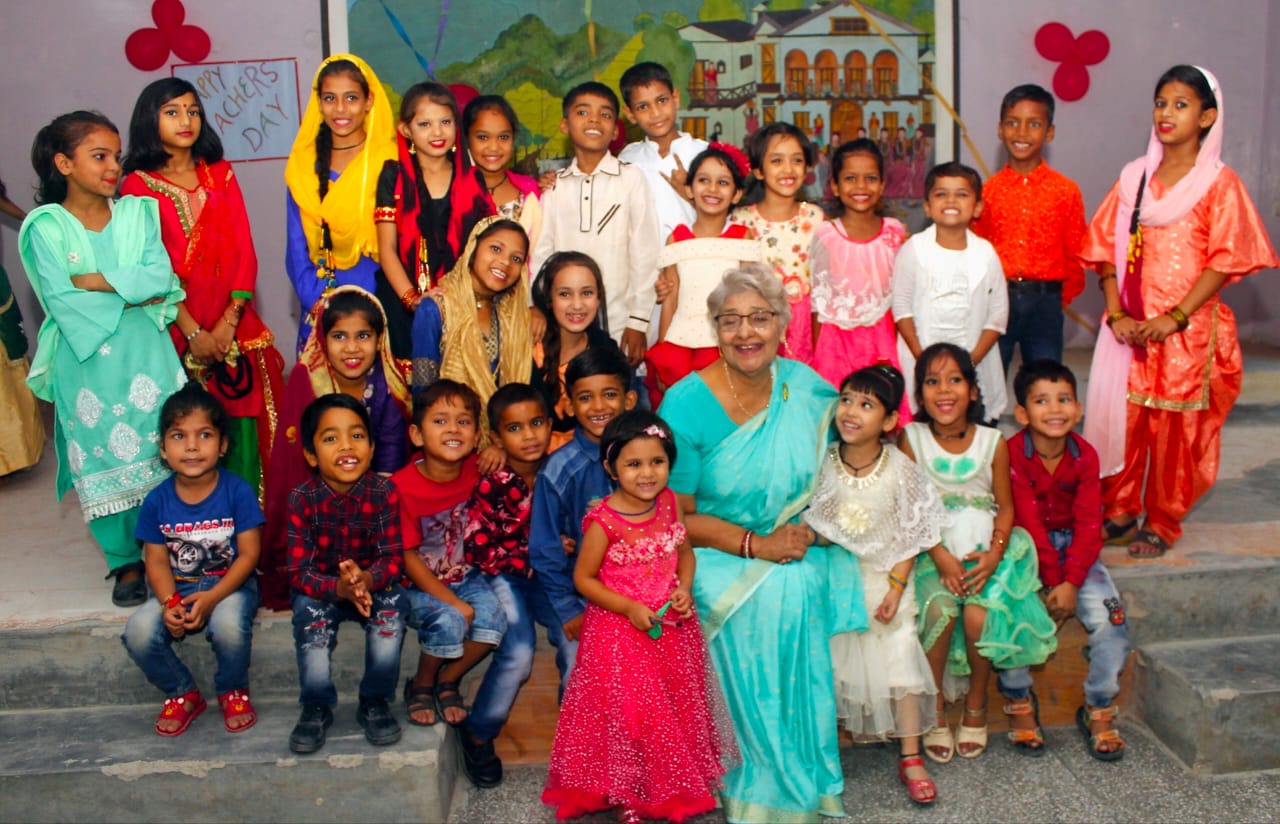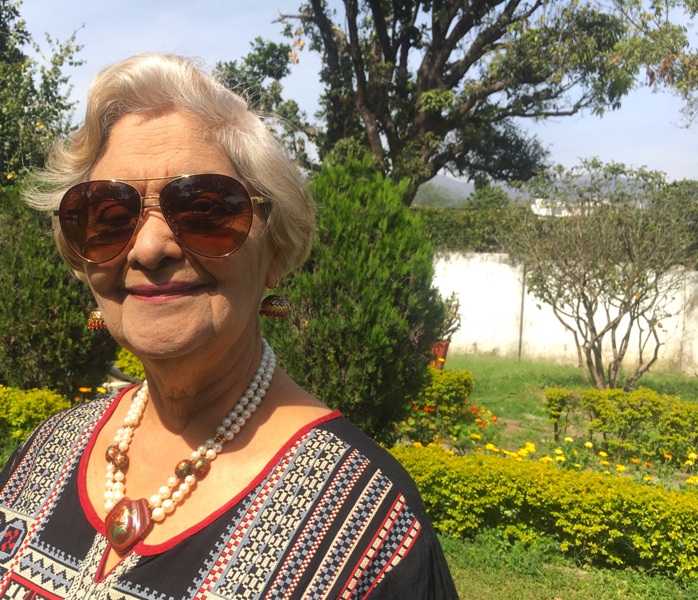As we observe Jan 24 as the day dedicated to our girl children in India, we ask Lalita Arya, co-founder of Khel Charities, a Dehradun-based NGO, about the progress of our girls in India
Lalita Arya is a social advocate, author, artist, educator, Vedic priestess, and initiator in the Himalayan tradition. She is also author of Eyeful of Sky, a book of poetry and prose. Forty years back, Ms Arya co-founded KHEL, short for Kindness, Health, Education, and Laughter, in Dehradun, with her husband, Pandit Dr Usharbudh Arya (later Mahamandaleshwara Swami Veda Bharati). Better known as Ammaji in the community, she considers her work with KHEL to be her greatest achievement of service to a community.
Arya was born into a large family of educators, priests, and social activists in Guyana (then British Guiana), South America, and was one of the first Indo-Guyanese women to graduate from the University of the West Indies, Jamaica. She speaks three languages fluently, English, Hindi, and Bhojpuri, the language of her ancestors who emigrated from British controlled India to the West Indies several generations ago. She has worked, lectured at the university level, and raised four children in four continents, and has actively helped raise her four grandchildren. Ammaji was instrumental in developing the first school founded by Pandit Arya in Guyana, helped found, managed, and often lectured at The Meditation Center in Minnesota, USA, and researched, advised on, and edited many of Dr. Arya’s books. At 85, Arya has been full of many adventures, and she expects there to be many more.
On the eve of the National Day for the Girl Child, Lalita Arya responded to a wide range of questions asked by Seniors Today. Read on… Content Alert: This interview has a discussion of rape and child abuse.
We love the acronym KHEL – and what it stands for (Kindness, Health, Education, Laughter). Could you tell us a bit about our girl child in India? In your opinion has there been much progress regarding her education, health, and safety in the country?
Before I answer your questions, I’d like to say a few words about my background. Originally, my family was from the area around the Sarayu Devi River. Like many Indians during the British Raj, some of my family members went to the Caribbean nations, so I am an Indo-Caribbean woman. My mother was an educator in Guyana, South America, where I was born and raised, and both my parents were active in social service. They believed in education as a great equaliser, and in serving the community. In the early 1980’s my husband and I moved our family to Dehradun from the United States, where we were living at the time. My husband, Pandit Dr. Usharbudh Arya (later Mahamandaleshwara Swami Veda Bharati), grew up in Dehradun, and his mother was a teacher at Kanya Gurukul. As you can see, education runs in our veins! When I saw so many poor children in Dehradun, I resolved to help as many of them as I could.
I’ve been privileged to see much of India, and it is a diverse and varied country. I do not feel qualified to speak in general terms about the conditions of its peoples. I can speak only from my 40 years of experience educating an underserved community on the outskirts of Dehradun. As you know, KHEL stands for Kindness, Health, Education, and Laughter. Originally, I worked mostly with leprosy patients and their children, so it stood for Kindness, Health, and Education for Lepers. As our community expanded and changed, we realised that our focus had grown to include under privileged children from a larger community. These four pillars of growth – Kindness, Health, Education, and Laughter – are not only what all children need in order to become successful adults, but also should be every child’s right. This name is practically our mission statement and informs everything we do.
Yes, definitely there has been improvement, and now there is a greater awareness of girls as integral to their communities. When we think of education as a way to change society, we must recognise that it will take a long time. The moments I cherish most are when a former girl student comes back to visit me as an adult, bringing her own children to me. That is when I can see the change that has been wrought.
Also, keep in mind that change may not occur the way we think it will! Giving a girl an education means she is free to make her own choices. This can take many forms. Besides the obvious benefits of later marriages and smaller, healthier families, girls who are educated have more of a say in their family’s home life because as adults they contribute financially. They have a say in who they will marry and opt to marry better educated men (this led us to expand our educational programs to encourage boys to get an education, as our young women had nobody to marry). These girls become women who now have the power to decide what parts of their culture they wish to uphold. It surprised me when one young woman we had educated and who was working was very happy to be able to earn enough for her own dowry! But that is how education works – we give it, and they decide how it will be used. Perhaps her daughter will think differently on this subject.
We must also consider other aspects of girls’ environment when we talk about education. What caste, class, religion are they? Does the educational environment encourage equality in all these areas? Are they menstruating? If so, do they have the supplies they need to come to school during their menstrual cycle? We cannot separate educating girls from all the other aspects of their lives, as all these inequities influence a girl’s ability to study and grow into a woman who can contribute to her community.

What in your view could help to improve the basic conditions of our girls? Especially the ones who live without square meals, in remote villages where they are at risk to all sorts of abuse?
Educated and uneducated girls are at risk everywhere, whether in a remote village or in a big city. Let us not support the fallacy that abuse does not occur everywhere, because it does. Until we stop thinking of girls as disposal, or as property, we will not solve these challenges. This is one reason I strongly believe in educating boys, too. As I said, children need kindness, health, education, and laughter to become successful adults. When girls have these four pillars, they uplift our society. Equity must encompass all areas of life. For example, if we build a school that has no bathrooms how will our menstruating girls study all day? If they don’t have adequate nutrition, how will their brains work? If they don’t get equal time on the playing field as the boys, how will they learn to work in a group, and win and lose gracefully? If they are limited in society by their caste, how will we ever see their full potential?
When I started educating children, we had no tools with which to educate them. They sat with me under the trees, drank a cup of milk, and sang a few songs. That’s what their capacity was, that was the community’s capacity. Why? Because the boys needed to go to work, and the girls needed to be surrogate parents at home because both parents had jobs to go to. Everyone worked, whether that meant begging, pouring tea at a chai stall, hauling bricks by the roadside, or watching an infant sibling. At first, we didn’t have any girls because they were at home with the little kids. So, the first thing we must do is look at the needs of the whole family to determine how we can, within that context, support education. If a boy needed to work or his family would go hungry, we paid that family what the boy would earn so he could come to school. Girls were sent to us because we fed them, saving the family one meal at home.
Also, just ask! Most of what we did – and do – is in discussion with our community. They help us decide (within our financial limitations) what programs to implement. So, what do these remote villages need? Does anyone ask the women, the ones who are actually hauling the firewood and fetching the water? Or do we just go in and build a one room schoolhouse with no bathroom, and then not offer a way for them to have a full-time teacher? Do we pull the children out of the fields during sowing and harvesting so they can sit in a classroom and learn from textbooks that have no bearing on their lives in a remote village (to be clear, I don’t believe in exploiting children for labour. But there is a difference between working with one’s family in one’s family business, to learn it as a skill, and being exploited)? You see, it’s not the remoteness or the village that is the problem. It’s that we, the so-called educated, think it’s the problem. We’re trying to fix the wrong things. Until we became government recognised and had to keep to an imposed schedule, we kept our kids coming to school by closing down during sowing and harvesting. We have (mostly) adhered to our policy of hiring from within the community and buying our supplies from within the community. By offering jobs, we encouraged people to stay in the community, build their businesses and their families, and to be proud of where they came from. The community wasn’t the problem – the way they were made to feel about their community was the problem. I started a school because the local schools wouldn’t take the kids from this community – the stigma of leprosy was too great.
In the mountain villages, it might seem easier to grow food as there is so much land available, but the ‘landlord’ system keeps poor farmers indebted. Fixing these economic issues would also help our girls because in a state of poverty, what can a poor farmer do but marry off his daughters, so he doesn’t have to feed them? When there is no choice of who to marry your daughter to, she is more likely to end up in an abusive situation.
I love this quote from American educator/ philosopher Brigham Young: “Educate a boy and you educate a man; educate a girl and you educate a generation.” .

Rapes. We read about them in the newspapers every day. The unreported ones must be innumerable. Young girls, tiny children being raped. Do you see a way out of this horrendous act upon our girl child?
Injustice is a part of human failings that has existed from time immemorial, not only in India but all over the world. Until the larger problem of the patriarchy can be solved, girls must be taught to defend themselves. What do I mean by this, the patriarchy? I mean the systems in place used by both men and women to keep girls and women ‘in line’. There is also the issue of caste related rape. These archaic systems must be obliterated if we are to see true change in our society.
This starts at home. Do we force our girls to be hugged by relatives, do we let people pinch their cheeks because we think it’s cute, do we let them choose their own clothes? First, we must teach them that they, and only they, decide what happens to their bodies. We must teach this to our boys, too, and we must model this behaviour for them. When a father pushes his wife around, his son will notice. When only the women in a home serve, the boys grow up thinking they deserve to be served. When they don’t get what they expect is their right, they become angry. Girls don’t exist in relation to someone else; they aren’t only Grandmother, Mother, Sister, Aunt, Daughter, Niece. They are wholly themselves and should be treated with respect simply because they exist, not because of their relationship to other people. Maybe it’s a good place to start, to say to a boy, only treat girls how you would treat your mother, but in the end, this just enforces the idea of girls only in relation to others.
It starts with the concept of shame, and the law. A girl who is raped is made to feel ashamed, as if she did something wrong. She is then further shamed by the authorities. Then even further, she becomes a pariah. A girl is raped by someone. That someone should be the one to be made to feel ashamed and should be punished. If the laws are not strong enough, they should be made stronger. If the local police chowki is ‘manned’ only by men, there should be more women police officers. If all the police officers are high caste, there should be more diversity in caste.
It starts with a woman’s sense of self. I once had a lady who was my helper in the kitchen. Her husband was an alcoholic and used to abuse her all the time. She used to complain about him, and I would tell her to avoid him when he would try to abuse her. Scream, shout, run out of the house, whatever just to get away from him. But she would argue, what would the neighbours say. One day, when she came with her face bruised, I knew what had happened. So, I finally advised her, when he approaches you to hit you, just cross your arms and put them up. She said okay. I forgot about that until one day, she told me how he came home drunk again and she did what I had told her. She said he was so surprised that I raised my hands that he paused, looked at her and turned away. He never hit her again.
It starts at school. We do not allow our teachers to hit our students, not even with a ruler to the palm or knuckles. If they can’t teach without resorting to violence, they should do some other job.
The opportunity to be born, opportunity to grow in a safe and secure environment, opportunity to develop one’s full potential are some of the major issues concerning the girl children in India. A look at some of the indicators of human development explain the problems of the girl children in our country – female infanticide and foeticide show no signs of declining. Your view on this disturbing fact?
I can’t speak to the statistics because I’m not knowledgeable in that area, and as I said earlier, I can only speak about the community I’ve worked with. Now I will be very blunt because when we talk about this subject, we must first talk about how a foetus comes into being. I was once chatting with the mothers of our school kids and I asked one woman why she had so many children even though the government freely distributed condoms. She laughed and said her husband’s hands were dirty from working in the fields all day and if they used a condom, she’d get an infection. So, even having the choice to use protection and not get pregnant was denied her. How are women to control their pregnancies – because it is mostly left to the women to do this – when there’s no water source at home to wash before and after the act, no place to do that in private, and no place to dispose of a used condom? The men didn’t want vasectomies because it made them feel less like men, and for women of this socio-economic level, taking time to have an operation was an enormous luxury even if they were ‘allowed’ to do so by the men in their household. And then there is dowry. How is a poor family to fund the marriages of several daughters without going into enormous debt? They must have more boys than girls to balance that. So, raising the standard of living and getting rid of dowry are two ways to reduce these horrible practices. And education in the long term, of course, because in general, educated women have fewer children.

What do you think the person on the street can do in India to improve the world for our girl child?
If you’re speaking in the literal sense of someone walking down the street, obviously they should immediately intervene if they see abuse occurring. If you’re talking about the ‘bigger picture’ of how each of us as individuals can make India a better place for our girls, that is a longer answer. We each can start by recognizing our common humanity, whether girl, boy, or transgender person (let’s not forget India recognizes three genders, and any discussion of gender is incomplete without them). We can raise our boys to be whole men capable of doing their own emotional labour, in control of themselves, and able to care for themselves and others instead of depending on the women around them to fulfill these needs. We can raise our girls to speak up for themselves even when we don’t like what they’re saying, and we can teach them that their existence isn’t relegated to their relationships – they are each their own person regardless of their status as mothers, sisters, aunties, and so on. A single woman who opts not to have children has as much right to a happy and fulfilling life as a woman with a husband and kids.
In conclusion: These are complicated questions and my answers only scratch the surface of thousands of years of culture and habit – I mean no offence to anyone’s sentiments. We can’t make change overnight. But we can change society with education – not just in the classroom but on the playing field, and in our homes. There will come a time when girls and boys and all genders are treated equally in society and under the law, and when everyone is able to live up to their full potential. In the meantime, we will continue to provide to our community Kindness, Health, Education, and Laughter.








